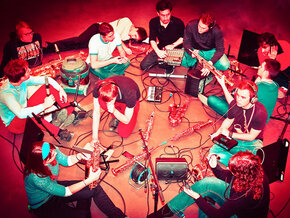- Study at the MUK
- Faculty of Music
- Faculty of Performing Arts
- Pedagogical Study Programmes
- Doctoral Programme
- Training Courses/Academic Diploma Courses
- International study programmes
- Co-registration
- Student Admissions Office
- Lecturers
Supervision Doctoral Programme
Each doctoral project at the MUK is supervised in terms of its artistic-scholarly content by two supervisors. As a rule, supervision is provided by one academic supervisor and one artistic supervisor. Both supervisors are considered equal in their supervisory relationship, i.e. there is no main supervisor for the dissertation project. For PhD projects that require or substantially benefit from interdisciplinary supervision, it is possible to engage supervisors from different research areas (e.g. Artistic supervisor: Composition/Music Theory, Scientific supervisor: Performance Art).
Applicants for the doctoral programme should personally approach the two supervisors they consider to be suitable before applying to the doctoral programme at the MUK. At least one of the supervisors must come from the MUK’s internal pool of supervisors; the second supervisor can be an external supervisor. The external supervisors should also be approached by the applicants themselves. External supervisors must be approved by the Head of the Doctoral Programme.
The requested supervisors should note their consent in the form of a supervision agreement.
For the selection process by the doctoral committee, the requested supervisors should also prepare statements for submission directly to the Head of the Doctoral Programme. Supervisors for the doctoral project in question are effectively appointed upon admission of the applicant to the doctoral programme. Until the research project is submitted, it is possible to change supervisors following approval by the doctoral committee.
In particular, the dissertation project is supervised during regular one-to-one supervisory meetings (Privatissimum) accompanying all stages of the doctorate. These private meetings ensure personal contact time between the supervisors and the doctoral student and provide the opportunity for supervisors and students to discuss and share ideas about the content.
Supervision also takes place as part of the artistic-scholarly colloquium, in which the doctoral student is given the opportunity to discuss and reflect on his/her own research project with the supervisors and fellow doctoral students in a professional and collegial exchange.
Supervision ends with the preparation of the supervisors' reports and the holding of the doctoral viva (Rigorosum). The supervisors’ reports are always supplemented by an additional external expert report.



